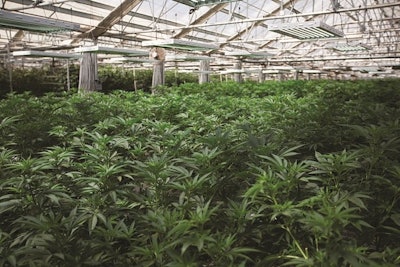

Water might be scarce in the desert, but Ultra Health’s acquisition of water rights has allowed it to support cannabis and hemp cultivation at two New Mexico sites.
In Bernalillo, N.M., Ultra Health, New Mexico’s largest medical operator, has 100,000 square feet of greenhouse and cold-frame cultivation space, alongside extraction and processing. It also runs 28 medical-only retail locations throughout the state.
A couple hundred miles south, in Tularosa, N.M., the business also grows hemp on about 30 acres and plans to grow greenhouse and outdoor high-THC cannabis there, if and when the state’s 34 licensed producers are no longer subject to a 1,750 plant count.
Ultra Health’s chief marketing officer, Marissa Novel, says taking the right steps to access water can be a make-or-break for cultivators. Following these water access tips can help them succeed.
1. Secure your own water rights.
Cultivators should secure their own water rights, Novel says, so they have more autonomy over their operation and avoid paying “additional fees or surcharges” that government entities, such as municipalities, issue.
“Other water sources, like municipal water systems, rural water cooperatives—these were not designed to support large-scale agricultural initiatives and larger commercial cannabis-cultivation activity,” Novel says.
In 2014, Ultra Health purchased about 11 acres of land in Bernalillo and 10 acre feet of water (about 3.26 million gallons to use every year) along with it. Then, in 2018, Ultra Health purchased 200 acres of land in Tularosa from a private owner, along with 1,000 acre feet of water (about 326 million gallons to use annually).
“Water rights provide growers with an ample and guaranteed amount of water,” Novel says, adding that the amount is usually more than what municipalities allow. While the upfront cost to secure water rights is more expensive than using water from a municipality, growers can ensure they are using water for its intended use rather than being subject to city officials’ decisions, which sometimes take the form of cutting off water supplies.
2. Purchase water rights from elsewhere if not bought with the land.
Growers can purchase water rights through a transfer, Novel says. “Cities, counties, et cetera … they have to secure their own water rights,” she says. “If your land, for instance, did not have water rights attached to it, you could potentially find someone else who owns water rights in the state, to purchase the right to use that water.”
3. If using municipal water, be upfront about it.
Municipal water is reserved for residential and commercial use, Novel says. Agricultural producers—such as cannabis cultivators—often use much higher amounts of water.
As cultivators set up in warehouses and other facilities that previously housed retail operations, Novel says municipalities can easily identify water use that exceeds the average amounts that retailers and residents use. Then, municipalities may issue penalties, such as surcharges for ongoing and past water use that can be 20% to 50% higher than normal rates, as well as interest on unpaid surcharges. (Any agricultural producer can be subject to these penalties, not just cannabis growers.)
“Depending on the zoning requirements of your area,” Novel says, “local officials could reconsider entirely and choose to not renew your special-use permit if you aren’t forthright and honest about the activities—like water usage—taking place inside the facility.”
“If you pay upfront, you can avoid paying a hefty surcharge accumulated from surcharges you should have paid in the past,” Novel says. “Paying upfront will also help you avoid issues like getting your special-use permit pulled.”

























